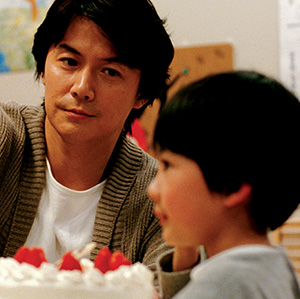

The switched-baby melodrama has been dormant for some time now. One of cinema’s great living kid-wranglers, Hirokazu Kore-eda, brings the once popular genre to life in the overlong, occasionally poignant Like Father, Like Son. As always, Kore-eda is capable of subtle, tender moments, but the too-stark contrast between the victimized families oversimplifies his story. It’s the problem of going big: he’s making a statement about the contrasts in today’s Japan, and he does it by illustrating a north-south split, which seems to be as much of a divide in Japan as it is in France, Italy or California.
Masaharu Fukuyama is playing an essentially stereotypical character: a cold, swaggering, success-chasing Tokyo architect. He’s pushing the boy who he believes is his son hard right at the beginning of his scholastic career—at age 6. Down in the south, the architect’s natural son is being raised by a much more easygoing dad—Yudai (Riri Furanki) the tattooed, Hawaiian shirtÐwearing proprietor of a funky fix-it shop/hardware store. Furanki’s presence proves the Howard Hawks principle that you ought to try to make a comedy out of your story. When you see the sympathy Kore-eda has for this happy-go-lucky slob, you wonder why the director bothered using the workaholic in his blood-freezing modern apartment as his starting point of the tale. Yudai has so much grit that he’s even openly looking forward to the settlement the hospital is going to lay on him for their mistake. Could Homer Simpson be earthier?
Naturally, Yudai is perfect and doesn’t have an arc to follow, and it’s the architect who needs to rescue his inner child. There’s never been a switched-baby melo without third-act problems, and this lauded (and doomed to an American remake) drama is no exception. There are instances where you’re certain that Kore-eda is as good as Mike Leigh or the Dardenne brothers in dramatizing the banal thought: the human race’s refusal to acknowledge the familial ties between us worsens the world. This inconceivable switched-at-birth situation takes on a sad plausibility in those instances: you wonder what you’d do if it happened to you.
Like Father, Like Son
Not rated; 121 min.



